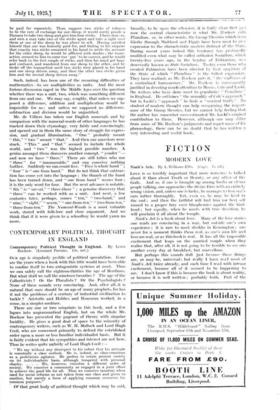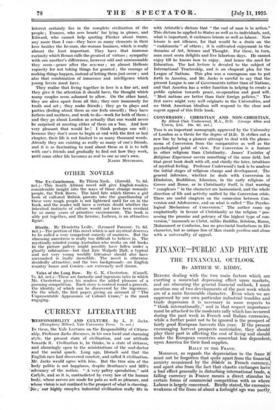FICTION
MODERN LO V E
Noah's Ark. By A. Williams-Ellis. (Cape. 7s. O.) LOVE is so terribly important that more nonsense is talked about it than about Truth or Beauty, or any other of the Gods. And so, if one is brought up among books or clever people talking, one approaches the divine Eros with an entirely- wrong vision, and, unless one is lucky, be manages to box ore's ears rather thoroughly. Yet, even so, he may be kind in the end ; and then the faithful will find him (or her) self roused to a proper fury over blasphemies against the God- head ; but equally, when he meets with true devotion, he will proclaim it all about the temple.
Noah's Ark is a book about love. Many of the love stories one reads are convincing in a way, but outside one's own experience ; it is rare to meet sheikhs in Kensington ; one never for a moment thinks them real, as one's own life and love are real, or as this book is real. It has all the impossible excitement that leaps on the married couple when they realise that, after all, it is not going to be terrible to see one another every day at breakfast, but marvellous.
But perhaps this sounds dull just because these things are, or may be, universal ; but really I have real most of Noah's Ark twice already, and each time I read with intense excitement, because all of it seemed to be happening to me. I don't know if this is because the book is about reality, or because it is well written ; probably both. Part of the
interest certainly lies in . the complete civilizatioa of the people ; Frances, who sees beasts' fur lying in planes, and Edward, who cannot help quoting Flecker about trams, any more than I can—they have so many elements in their love besides the he-man, she-woman business, which is really almost the least important. They have that immense curiosity which Renan calls the greatest of virtues ; sympathy With one another's differences, however odd and unreasonable they seem—peace after the sex-war ; an almost Hellenic capacity for not taking things for granted ; the courage of making things happen, instead of letting them just occur ; and also that combination of innocence and intelligence which young lovers must have.
They realise that living together in love is a fine art, and they give it the attention it should have, the thought which many couples seem ashamed to allow. On the other hand, they are alive apart from all this ; they care immensely for truth and art ; they make friends ; they go to plays and parties (feeling about them as one feels oneself) ; they have fathers and mothers, and work to do—work for both of them ; and they go about London so actually that one would never be surprised at meeting either of them on a 'bus. And how very pleasant that would be ! I think perhaps one will ; because they don't seem to begin or end with the first or last chapter, their life is not limited to so many thousand words. Already they are existing as really as many of one's friends, and it is as fascinating to read about them as it is to talk with one's friends and gradually to find out how they work, until some other life becomes as real to one as one's own.
NAOMI MITCHISON.



























































 Previous page
Previous page